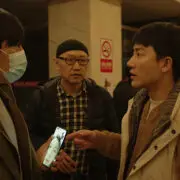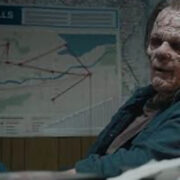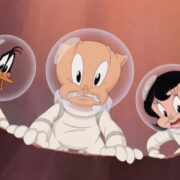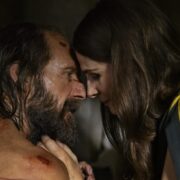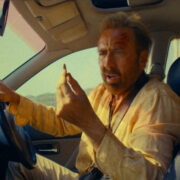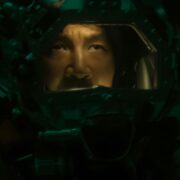Interview With GOD’S OWN COUNTRY Director Francis Lee

Alex is a 28 year-old West Australian who has a…
During my second week at the Melbourne International Film Festival, I had the pleasure of talking to Francis Lee, the director of God’s Own Country. Having seen his terrific debut feature the night before, we talked about the film’s inception, the huge critical response the film has received internationally, and how he went about perfecting its real authentic feeling.
Alex Lines for Film Inquiry: God’s Own Country has really exploded internationally, and you were able to debut the film at Sundance earlier this year, so I wanna ask what that experience at Sundance was like?
Francis Lee: It was really extraordinary and a little bit weird. I didn’t really think about what was going to happen with the film when I was making it, I just tried to stay really focused, really blinkered, work on the film and Sundance were the first people to see it, they saw a rough cut of it, so they hadn’t seen the finished version, but they selected it and I hadn’t finished it so I had to finish it, so I didn’t finish it until the beginning of January, and then I was literally on a plane to Sundance, so there was no time to really think about it, process it, nothing.
We went to Sundance and the film played, it completely sold out and the audience reaction started to be incredible. Really surprisingly incredible and then the reviews came out and they were really incredible. It was quite overwhelming, because I had made this film you know, in the area where I grew up, where I live and where my family are, for it to suddenly hit the biggest film festival in America and get the reaction it got it did was humbling and overwhelming.
One of the elements I really appreciated about the film was its universal appeal. Its a film for all adult audiences, it never feels exclusionary or niche. With the creation of this film, was this something important to you?
Francis Lee: No, it was something I never thought about at all. What I thought about was the story I wanted to tell, and to be very truthful to the characters. I guess I knew I didn’t want to tell a coming out story and I guess I didn’t want to tell a story about the difficulties of being gay, I think because that had never been my experience. What I wanted to focus on, the thing I had always found the hardest in my life was falling in love and having to be open and vulnerable, to love and be loved. It was very important to me to look at a character who is going through that and not around his sexuality.
Was there something you seeing in other queer cinema that wasn’t being represented properly?
Francis Lee: No, not particularly, one of the things I hadn’t seen depicted in a way I saw it was rural Yorkshire, was working class people in Yorkshire and that’s really what I was looking at. Looking at that world, looking at that landscape, looking at those people, just in the way I saw them. In terms of other queer films, I don’t think I was trying to address anything.
I want to get into some of the more technical elements of the movie. Was the reserved use of music a conscious decision since the film’s inception? Because I reckon the lack of overall score makes the song choice at the end so much more powerful.
Francis Lee: Yeah and it such a great song, did you know Patrick Wolf’s music beforehand?
No I did not.
Francis Lee: He’s incredible. Yes, [the lack of music] was a conscious decision. It came out of, I hadn’t really thought about music, but I did know, I have very sensitive hearing, I did know I wanted I wanted to be fully immersed in this world, and I love sound. Natural sound, I think for me, it’s often as important as the visuals, sometimes more important. I think it can convey emotion, sense of place, it can kinda deliver all the things that a traditional film soundtrack can do. Also these people on this hill, are people who don’t have music in their lives, so suddenly to have music playing from somewhere, it didn’t feel authentic or right.
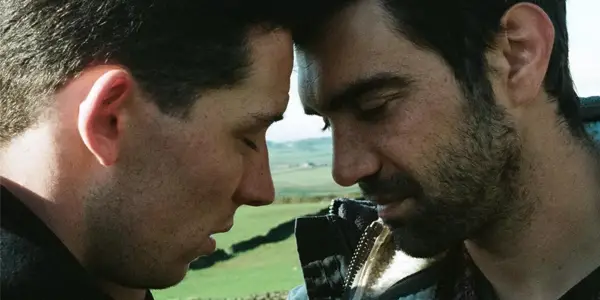
The only music we really hear is in the pub, the CD player they have in the pub, so I built this soundscape really, as my soundtrack and I got my sound designer out recording hours and hours of atmosphere from all the locations, from all the places in Yorkshire, bird sounds, everything. Then in the edit, we started to build this soundtrack, so its very specifically orchestrated, the specific wind sounds, the bird sounds appear at very specific places and the birds are significant in the type of bird they are, because of the metaphor that that means to me. I think for me it makes a much more immersive journey, you see it, you hear it, you feel like you’re there.
The cinematography does a great job in selling the intimacy between the 2 main characters and also selling the grisly, tactile feeling of working on a farm. How was the process of achieving this cinematography?
Francis Lee: I worked with Joshua James Richards, the cinematographer, who is an artist in his own right, he’s an incredibly gifted, clever man, we worked for 3-4 months before the shoot, and we just talked through the film a lot and we talked through how it felt, how it looked, how the camera would move, so we created a little rule book, what the camera could and couldn’t do, where it could be positioned and where it couldn’t, how it would move, I think we worked out pretty quickly that we wanted to see this world from Johnny’s perspective, so we knew the camera was always going to be up close and personal to Johnny, and I was very keen on not depicting this landscape in big wide iconic impressive shots, I knew I wanted to see the effect the landscape had on the characters rather than the landscape itself.
So again, it was all about keeping it tight with Johnny’s perspective, following him through this journey. Joshua and I worked from a reference bank of photographs and paintings, with paintings in particular being useful because they’re very textured. That really helped, as did examining the lighting in paintings, its very interesting. We kinda built all that up and worked from those images.
I did notice that you put a lot of thought into the lighting of the different characters, in terms of shifting the colour temperature from cold to warm, reflecting the change in the characters.
Francis Lee: Absolutely. So what was super important was the shift. The changes, the subtle changes, so when Gheorghe arrives for example, he changes the atmosphere of the places he’s in. So when Johnny shows him the caravan for the first time, there’s this horrible dangling bare-bulbed light, the whole place looks horrible but what he [Gheorghe] does, is he takes the bulb out, and he puts it into a lamp, and he instantly changes that place and the atmosphere of that place and it almost becomes a home. He brings comfort with him, which is an idea that we carried throughout, we used very little artificial lighting, most of it was source.
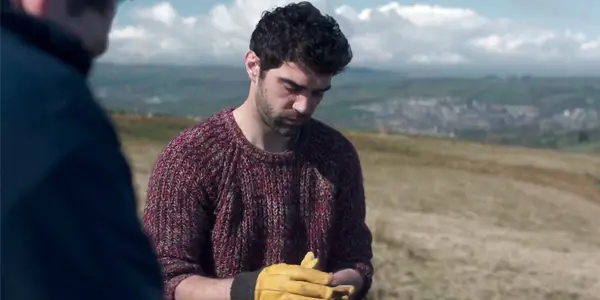
The script is really well-written, and I appreciated the subtext in the film’s dialogue. I also noticed a lot of mirrored imagery in the film, such as the spitting, Johnny Saxby being missing when these accidents occur on the farm, Gheorghe and Johnny’s fighting techniques, I love these sort of subtle details. So how long did it take for you to transfer the initial idea for the film to the finished script?
Francis Lee: Yeah, the script is incredibly detailed, but there’s not a lot of dialogue in it. Its all description, so every look, every touch, every kind of gesture is all written in the script, so I was quite prescriptive.
My process for writing this script was I had this idea, then I thought about it in my head for about 6 months, then I worked it all out, who they were, what they were, what they wanted, what was stopping them from getting what they wanted, what the beginning, middle and end was and as soon as I had that, I sat down and wrote it, I wrote it quite quickly, in about 4-5 days, and then I spent about a week making it readable.
That was the first draft and then the process, as the script developed, the process became the structure never changed, the characters never changed, it just became about pressing deeper all the time, always looking for more truth. Always looking for the authenticity and just the emotion.
I read that you shot the film chronologically to help build the relationship a lot more authentically on-screen. Was that a difficult thing on a production side?
Francis Lee: Yes, I think it was always be a challenge for a production to shoot chronologically, because obviously they schedule films around locations, so let’s say if we were shooting in this room and we had 10 scenes, but they might’ve been Scene 1, Scene 10 etc, you just shoot them all back to back because you had the location.
It becomes challenging for production design, because what they have to do is prep so many other sets beforehand, so in a day, usually they might only have to prep one set, but on this film, they had to prep like 5 or 6. Also, you lose a lot of time, because you have to move in between the sets and set up and all that.
The main actors in the film (Johnny and Alec) did extensive training in farmwork to make their scenes feel a lot more authentic, but how was it having so many extensive scenes with live animals? They say that working with animals can always be so unpredictable.
Francis Lee: Well it was so interesting, so I knew first of all I never wanted any fakery in this film, I never wanted a hand double or a stunt double, the boys would have to do everything and what they had to do was quite proficient, such as birthing lambs, examining cows, all that kinda thing, skinning a lamb, there’s a real skill involved, so they went off and worked on farms for two weeks solidly, they’d do 8-9 hour shifts a day and they learnt everything, they had to really get in that world.
In terms of working with animals, it was actually not as problematic for me, because my dad is a farmer, we had his friend Martin as our animal handler, who is also a farmer, and they’re his sheep, so he knows them very well, he’s very pragmatic. So actually, the animal stuff was okay, the weather was the most difficult part.
Speaking of the actors, how did you go about casting Johnny and Alec? Was it an audition process or did you know the guys beforehand?
Francis Lee: No, I didn’t know either of them before or any of the work they had done previously. I worked with a casting director in London, she came up with a list of actors and Joshua O’Connor was on that list and I liked the look of him, but he wasn’t in the UK, he was filming a TV series in Corfu, so I didn’t get to meet him, but I sent him a couple of scenes to record on tape and I got the tape back and I got this tape and I was convinced he was from the north because his accent was so good and he delivered this really incredible, incredibly emotionally repressed, mangled kind of reading, that I thought, oh god, there’s something really interesting going on here, he’s clearly very tortured.
About two weeks later I met him in London and I was really shocked because Josh is, first off he’s from Cheltenham, which is a lovely middle class town in the south of England, he’s really smiley and funny, he’s really generous and open, very beautiful, gangly and fun, and I thought, God, how the hell did he do that on the tape? Then I started to work with him, and I realised very quickly, he’s a totally transformative actor, so he’s one of those rare actors that’s got the ability to totally shapeshift, to create somebody else, physically and emotionally and that really excited me, because I love to work that way.
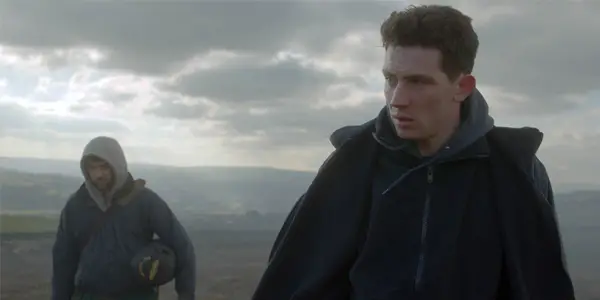
So we cast him and then I went to Bucharest, Romania, to work with a brilliant casting director there and she drew up a list of people, who all came in to see me, really amazing actors in Romania. Then Alec Secareanu comes in and he was very focused and intelligent, he intrinsically understood who this person was and was able to deliver, because it’s a really hard part, he really had to deliver this warmth, this almost maternal instinct, his driving force is to care, that’s what he gets off on, but he’s not a push-over. So it’s a very fine-line and Alec was just incredible. The film was going to live or die by its chemistry so I made a shortlist of 3 Romanian actors, flew them over to the UK, worked them each with Josh, and luckily, my favourite Alec, worked the best with Josh together.
Now I know that you worked as an actor before, did these experiences as an actor inform how you directed the actors in this film?
Francis Lee: Yeah totally, first of all I understand their process, I also understand how horrific it is to stand in front of a camera and make yourself vulnerable and deliver a performance. From the get-go, I wanted to make them feel protected, that we built this very trusting bond, that they knew that I would always be there for them, regardless, and they would always be my focus.
I love building characters from scratch and knowing everything about them, so that’s what I brought to the rehearsal period. We built these characters over a three month period, from the moment they were born to the moment we see them in the film. We learnt everything about them, we were totally immersed in who they were. The other major factor was communication, having a dialogue where you’re able to articulate what you want.
With this movie, was there any other directors or films that informed its creation, any major cinematic influences?
Francis Lee: Maybe everything I’ve ever seen, but nothing specifically. There’s filmmakers I love, who would probably be the biggest influences, would be The Dardenne Brothers or Jacques Audiard, so those kind of very character-driven European directors.
God’s Own Country is due to be released in Australia 31st August, in the UK on September 1st and in the USA on October 27th.
Does content like this matter to you?
Become a Member and support film journalism. Unlock access to all of Film Inquiry`s great articles. Join a community of like-minded readers who are passionate about cinema - get access to our private members Network, give back to independent filmmakers, and more.








